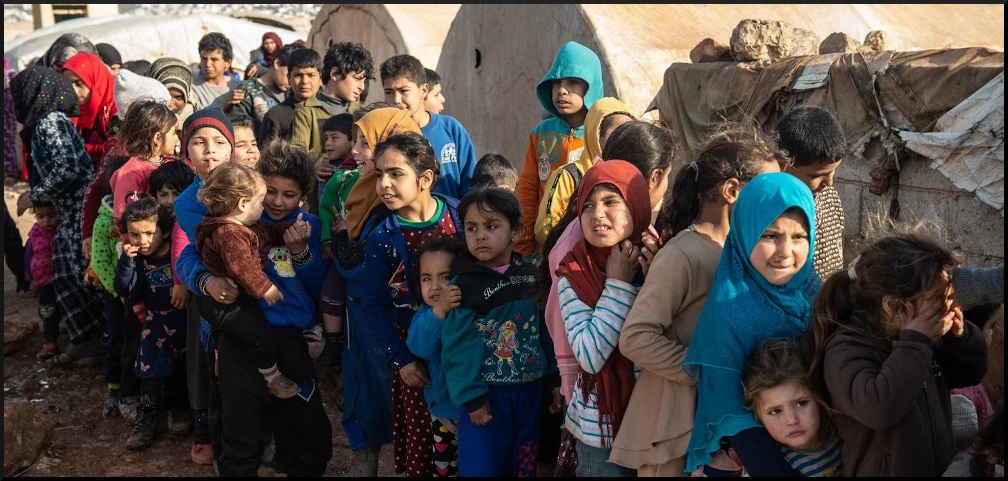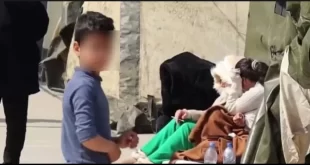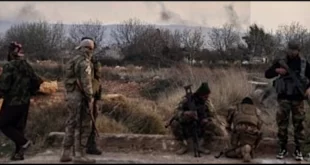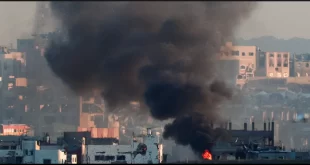by Rodayna Radan, published on The New Arab, October 28, 2022
The site this comes from is hostile to the Syrian Government. However, there are a couple of interesting aspects to this story. First, a friend was just complaining to me about single mothers in the US who use their lives and their children’s lives to get money on TikTok. Second, this article focuses on people in Idlib where they have considerably less freedom than in the rest of Syria. And where are Hayt Tahrir al Sham and the other fundamentalist overlords in this picture? Could they be the middlemen who collect 1,000 followers so these impoverished refugees can get online?`
In any case, this is the result of devastating a functioning country, first through a vicious proxy war, and then through draconian sanctions. Prior to these interventions, people in Syria were not starving as the government provided significant economic assistance to the people where necessary. [Editor]
‘Please like, please share, please gift‘ is one of the most common phrases used by Syrian children and their parents on TikTok live streams to convince viewers to donate virtual gifts, which in return can be withdrawn as cash.
Amina Sultan is a single mother of four who lives in Northern Syria. She earns as much as she can from live streams she makes with her children on TikTok, where she shares stories about the hardships they face in the hopes that viewers across the world will sympathise with their plight and provide them with gifts.
“I am not a technology expert, so my cousin helped me set up the account and I use his phone every night to stream live for three to four hours with the children,” Sultan told The New Arab.
“The number of gifts we are receiving has exceeded my expectations, I’m thankful for all the donors but I’m aware that we are only receiving a little percentage of the total value, which I find unfair because it is not easy to sit in front of a screen begging and feeling pitied,” added Sultan.
Tiktok users need at least 1,000 followers to go live, and when they do, other users can reward creators with digital gifts for the content they like. The gifts are bought with real money, ranging from roses and hearts, which cost less than a dollar, to universes and lions, which cost around $500.
Hamid Al Oulwa, known as a TikTok middleman in one of the camps for displaced people in Syria, sold all his belongings to buy a phone and make a living by helping families stream live on the platform using his phone and internet connection.
“I work with twelve different families now since I started six months ago, and I withdraw the value of the digital gifts from a money transfer shop in a town outside the camps through an account connected to my bank card,” Al Oulwa told the BBC in an interview.
TikTok algorithms suggest content based on where your SIM card comes from. According to Al Oulwa, the SIM card he uses is a British one in order to get British viewers on his live streams because he finds them to be the most generous gifters.
Digital rights advocates have criticised the platform for allowing this kind of content to be streamed.
“It is unfortunate that these children are being used as a tool of sympathy to gain some money, they’re being exploited on live streams which can expose them to certain psychological damage,” Rawan Hassan, a digital human rights educator based in the Middle East, told The New Arab.
A recent BBC investigation tracked dozens of accounts that were going live from camps in Syria that would sometimes make more than $1000 an hour in gifts, but not all of the amount goes to users.
The investigation found that TikTok middlemen are getting help from agencies in China in exchange for part of the profit gained from the value of gifts. These agencies are a growing part of TikTok’s global business strategy, contracted by the platform to help TikTokers make money from live streams.
“The BBC documentary revealed that there are at least five agencies working with Syrian families in camps that say they’re paid by TikTok to bring live streamers to the platform. TikTok takes 50-70% of profits from live gifts and some of that is paid to the agencies,” says Hassan.
In an experiment done by the BBC, a set-up account revealed that Tiktok took a staggering 70% of the total value of the gift. The money transfer shop takes 10% and the TikTok middlemen take up to 35%, leaving very little for the actual user.
In these camps, jobs are scarce and people are left with few options to earn any source of income, so begging for financial assistance on the platform is becoming increasingly prevalent out of desperation and poverty.
Rather than shifting blame to those families, platform accountability experts believe the company and those agencies working with TikTok should be held accountable for taking advantage of people’s needs and profiting at the expense of children.
“By appearing in videos and live streams, children are providing their location and highlighting the precarity of their situation, both of which can help child traffickers identify and threaten them”
“TikTok has a responsibility to respect human rights and to ensure that its services are not used to violate them as their guidelines state that they prohibit activities that perpetuate the abuse, harm, endangerment, or exploitation of minors on the platform,” confirmed Haya Abdallah, a social media lawyer from Syria.
According to Abdallah, children appearing in live streams are exposed to dangerous risks. The severity of these can vary, according to Abdallah, with the most common being exploitation for commercial purposes and the biggest threat being the potential for child trafficking.
By appearing in videos and live streams, children are providing their location and highlighting the precarity of their situation, both of which can help child traffickers identify and threaten them, explained Abdallah.
In a statement to the BBC, TikTok said they were deeply concerned by what the investigation had found and stated that these videos are not allowed on their platform, but declined to say how much it takes from gifts. Tiktok has now banned all of the accounts and is set to ban all users under 18 from live streaming.
Mohammed Safadi, a journalist in Northern Syria, told The New Arab that money does not necessarily have to be earned through live streams.
“Some people are also making money by posting videos that show the state of poverty they live in, whilst also showing vulnerable kids to reTikTok, receive money directly from donors through posting their phone numbers. This kind of content does not seem to be censored by TikTok,” Safadi said.
In the absence of other viable sources of income in the camps, however, it is unclear how successful the enforcement of a ban could be, and whether displaced Syrians will continue to turn to social media in an attempt to escape the desperate poverty around them.
A final thought. Who are these local fixers who set up the families, and why are they not restrained by the rigid, paternalistic, hyper moralizing salafist jihadis who govern these areas? The author doesn’t want to blame the families and neither do I. TikTok provides a platform and the US version has the same flaws in general as the Chinese one. It is the middlemen in Syria, that are exploiting these families and keeping the lion’s share of the profits. [Editor]
Rodayna Raydan is a Lebanese British journalism graduate from Kingston University in London covering Lebanon.
 Syria Support Movement solidarity with the Syrian people
Syria Support Movement solidarity with the Syrian people





